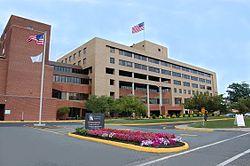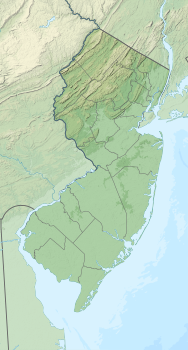
Back باسيك (نيوجيرسي) Arabic پاسایک، نیوجرسی AZB Пасейк Byelorussian Пъсейик (град) Bulgarian Passaic (Nova Jersey) Catalan Пассейк (Нью-Джерси) CE Passaic, New Jersey CEB Passaic, New Jersey Welsh Passaic DAG Passaic German
Passaic, New Jersey | |
|---|---|
 St. Mary's General Hospital in Passaic, New Jersey | |
 Location of Passaic in Passaic County highlighted in yellow (left). Inset map: Location of Passaic County in New Jersey highlighted in black (right). | |
 Census Bureau map of Passaic, New Jersey | |
| Coordinates: 40°51′27″N 74°07′45″W / 40.857552°N 74.129089°W[1][2] | |
| Country | |
| State | |
| County | |
| Settled | 1679 |
| Incorporated | April 2, 1873 |
| Government | |
| • Type | Faulkner Act (mayor-council) |
| • Body | City Council |
| • Mayor | Hector C. Lora (term ends June 30, 2025)[3][4] |
| • Administrator | Rick Fernandez[5] |
| • Municipal clerk | Weatherly Frias (acting)[6] |
| Area | |
| • Total | 3.24 sq mi (8.39 km2) |
| • Land | 3.13 sq mi (8.11 km2) |
| • Water | 0.11 sq mi (0.28 km2) 3.33% |
| • Rank | 326th of 565 in state 11th of 16 in county[1] |
| Elevation | 98 ft (30 m) |
| Population | |
| • Total | 70,537 |
| • Estimate | 68,903 |
| • Rank | 552nd in country (as of 2023)[12] 16th of 565 in state 3rd of 16 in county[14] |
| • Density | 22,514.2/sq mi (8,692.8/km2) |
| • Rank | 7th of 565 in state 1st of 16 in county[14] |
| Time zone | UTC−05:00 (Eastern (EST)) |
| • Summer (DST) | UTC−04:00 (Eastern (EDT)) |
| ZIP Code | |
| Area code(s) | 973[17] |
| FIPS code | 3403156550[1][18][19] |
| GNIS feature ID | 0885342[1][20] |
| Website | www |
Passaic (/pəˈseɪ.ɪk/ pə-SAY-ik[21] or locally /pəˈseɪk/ pə-SAYK[22][23][24]) is a city in Passaic County, in the U.S. state of New Jersey. As of the 2020 United States census, the city was the state's 16th-most-populous municipality,[25] with a population of 70,537, falling behind Bayonne (ranked 16th in 2010),[10][11] an increase of 756 (+1.1%) from the 2010 census count of 69,781,[26][27] which in turn reflected an increase of 1,920 residents (+2.8%) from the 2000 census population of 67,861.[28] The Census Bureau's Population Estimates Program calculated a population of 68,903 for 2023,[13] making it the 552nd-most populous municipality in the nation.[12] Among cities with more than 50,000 people, Passaic was the fifth-most densely populated municipality in the United States, with more than 22,000 people per square mile.[29]
Located north of Newark on the Passaic River, it was first settled in 1678 by Dutch traders, as Acquackanonk Township. The city and river get their name from the Lenape word "pahsayèk" which has been variously attributed to mean "valley" or "place where the land splits."[30][31][32][33]
- ^ a b c d 2019 Census Gazetteer Files: New Jersey Places, United States Census Bureau. Accessed July 1, 2020.
- ^ US Gazetteer files: 2010, 2000, and 1990, United States Census Bureau. Accessed September 4, 2014.
- ^ Cite error: The named reference
Officialswas invoked but never defined (see the help page). - ^ 2023 New Jersey Mayors Directory, New Jersey Department of Community Affairs, updated February 8, 2023. Accessed February 10, 2023.
- ^ Administration, City of Passaic. Accessed March 11, 2023.
- ^ Municipal Clerk, City of Passaic. Accessed March 11, 2023.
- ^ Cite error: The named reference
DataBookwas invoked but never defined (see the help page). - ^ "ArcGIS REST Services Directory". United States Census Bureau. Retrieved October 11, 2022.
- ^ "City of Passaic". Geographic Names Information System. United States Geological Survey, United States Department of the Interior. Retrieved March 8, 2013.
- ^ a b c Cite error: The named reference
Census2020was invoked but never defined (see the help page). - ^ a b Cite error: The named reference
LWD2020was invoked but never defined (see the help page). - ^ a b c Estimates of the Resident Population for Incorporated Places of 20,000 or More, Ranked by July 1, 2023 Population: April 1, 2020 to July 1, 2023, United States Census Bureau, released May 2024. Accessed May 30, 2024. Note that townships (including Edison, Lakewood and Woodbridge, all of which have larger populations) are excluded from these rankings.
- ^ a b Cite error: The named reference
PopEstwas invoked but never defined (see the help page). - ^ a b Population Density by County and Municipality: New Jersey, 2020 and 2021, New Jersey Department of Labor and Workforce Development. Accessed March 1, 2023.
- ^ ZIP code lookup for Passaic, NJ, United States Postal Service. Accessed August 28, 2011.
- ^ Zip Codes, State of New Jersey. Accessed October 16, 2013.
- ^ Area Code Lookup - NPA NXX for Passaic, NJ, Area-Codes.com. Accessed October 16, 2013.
- ^ U.S. Census website, United States Census Bureau. Accessed September 4, 2014.
- ^ Geographic Codes Lookup for New Jersey, Missouri Census Data Center. Accessed April 1, 2022.
- ^ US Board on Geographic Names, United States Geological Survey. Accessed September 4, 2014.
- ^ AP-News Pronunciation Guide L-R, KRGV-TV, June 10, 2012. Accessed August 16, 2012. "Passaic -- puh-SAY'-ihk"
- ^ Page, Jeffrey. "Our towns challenge our tongues", The Record, June 17, 2005. Accessed May 19, 2021, via Newspapers.com. "Some people also add an extra syllable to Passaic. They say pa-SAY-ik, which renders them incomprehensible when speaking with residents, especially old-timers. 'The correct pronunciation is puh-SAKE,' said Mark Auerbach, the city historian. Very authoritative, but he himself says pa-SAY-ik. What is that all about? 'Yes, it's wrong,' he said, 'but I'm from Brooklyn and I'm too old to change habits now.'"
- ^ Jennings, Rob. "N.J. welcome center sign spelled P-A-S-S-A-I-C wrong", NJ Advance Media for NJ.com, July 11, 2019. Accessed May 19, 2021. "Of New Jersey’s 21 counties, it is easy enough to understand why some persist in misspelling Passaic. Sure, the pronunciations -- 'puh-SAY-ik' or 'puh-sake' - provide a clear hint to the ordering of letters, yet it is not uncommon to spot the county mistakenly listed as 'Passiac.'"
- ^ Martin, Jim. "Jim Martin", Schenectady Gazette, June 3, 1970. Accessed May 19, 2021, via Newspapers.com "When you have to run 20 miles a day through a corridor of urban sprawl without bumping into Hackensack, South Orange (pronounced 'Arnj'), Passaic (pronounced 'Puh-sake'), Cedar Ave., Nutley or the Delaware-Lackawanna tracks, you are a human being of extraordinary determination."
- ^ Table1. New Jersey Counties and Most Populous Cities and Townships: 2020 and 2010 Censuses, New Jersey Department of Labor and Workforce Development. Accessed December 1, 2022.
- ^ Cite error: The named reference
Census2010was invoked but never defined (see the help page). - ^ Cite error: The named reference
LWD2010was invoked but never defined (see the help page). - ^ Table 7. Population for the Counties and Municipalities in New Jersey: 1990, 2000 and 2010, New Jersey Department of Labor and Workforce Development, February 2011. Accessed May 1, 2023.
- ^ Maciag, Mike. "Population Density for U.S. Cities Statistics", Governing, November 29, 2017. Accessed December 4, 2020. "The following are the most densely populated cities with populations exceeding 50,000:... [5th] Passaic, N.J.: 22,424 persons/sq. mile"
- ^ Cunningham, John T. This is New Jersey, p. 67. Rutgers University Press, 1994. ISBN 978-0-8135-2141-1. Accessed January 27, 2015. "Passaic was a Lenape word, too. Some say it meant 'place where the land splits' or 'place where the river splits'. Others claim the word meant 'valley' to the Lenape."
- ^ "Passaic" Archived September 24, 2015, at the Wayback Machine, Lenape Talking Dictionary. Accessed January 27, 2015.
- ^ Hutchinson, Viola L. The Origin of New Jersey Place Names, New Jersey Public Library Commission, May 1945. Accessed September 16, 2015.
- ^ Gannett, Henry. The Origin of Certain Place Names in the United States, p. 239. United States Government Printing Office, 1905. "Passaic; county, city in same county, and river in New Jersey; derived either from the Indian word, passaic or passajeek, 'valley,' or from the Indian equivalent of 'peace'."



